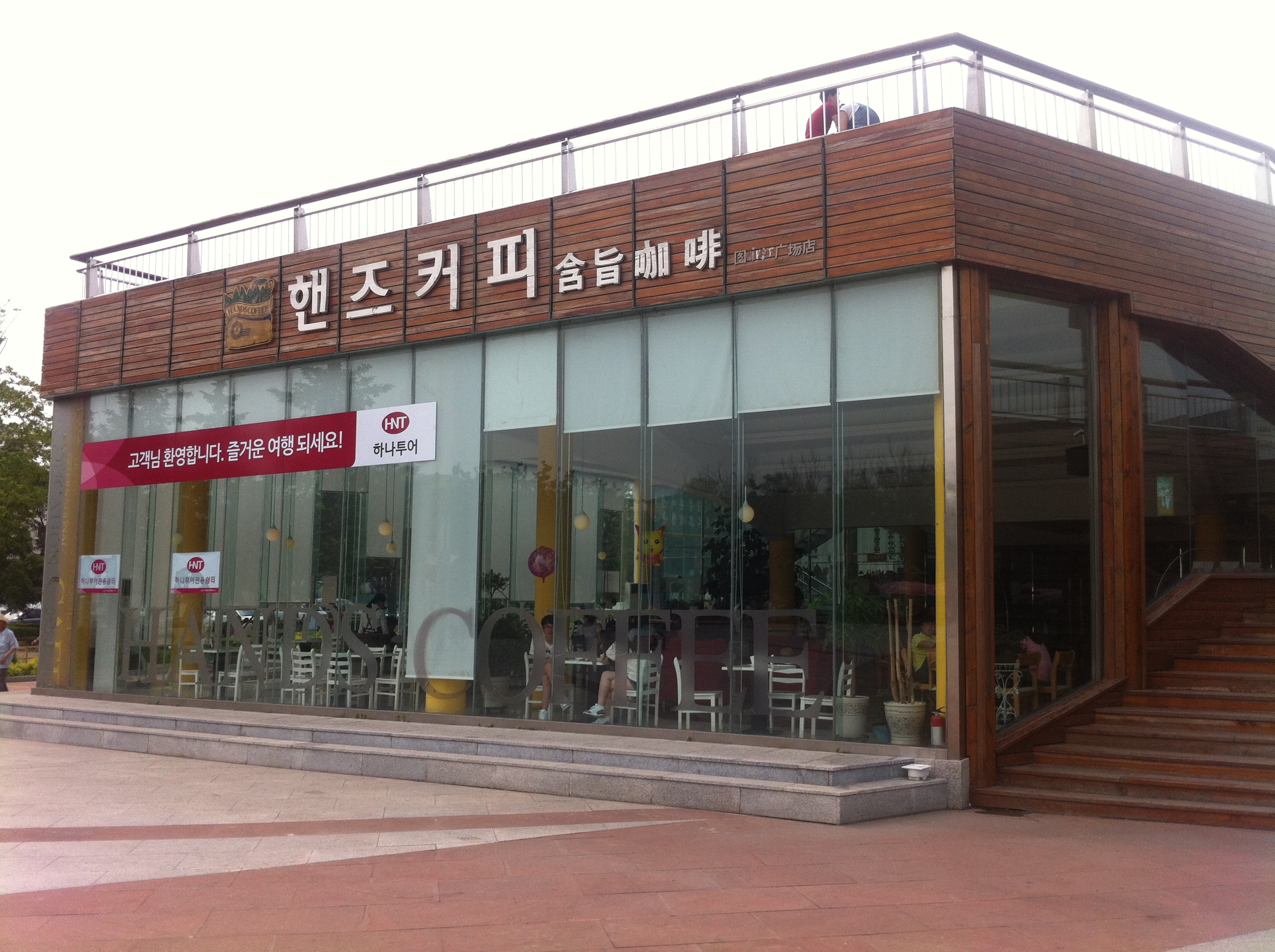Yanbian Autonomous Prefecture in China is a fascinating place. Its major city, Yanji, has experienced a huge economic boom in recent years. Connections with wealthy South Korea grow every year, new apartment blocks are springing up everywhere and it is soon to be connected to high-speed rail. In the area, three or four distinct Korean cultures intermingle: Korean-Chinese from the prefecture, Korean-Chinese from outside, North Koreans and South Koreans.
Gabeeyang interior and baking cubby hole
It is largely due to the latter than Yanji is probably the best coffee town in China, with roasters, specialty shops and huge student hangouts: cafes the size of basketball courts. Its a region where you won't find a Starbucks, but you can find yourself a hand-drip cup of Sidamo, when in season.
If you happen to be in the area, say, in order to run Rason's first ever business workshop last month, you should consider getting your coffee-fix on the border. Coffee in Rason has yet to impress (not the greatest of its issues, though).
Yanji has a broad selection of cafes, too numerous to list here, but the standout for this bean-hound* is Gabeeyang Cafe, an outpost of a very small South Korean chain.
Uni students: their expressions don't reflect the quality of the choco-caramel whatevers they were drinking.
They have outstanding, bright, fruity espresso shots, a selection of single-origin cafes and all the K-pop you can handle. They roast on-premises. Gabeeyang is located just east of the Yanbian University, below Gina's Place, a popular western hangout with a menu that reminds you of food you liked back home.
Other noteworthy mentions in that neighborhood are the massive Wan Cafe, right across from the university main gate, and a Hands Coffee, a block west of that.
Some 45 kilometers away, one finds Tumen City, which now boasts a handful of coffeeshops, having only gotten streetlights a few years ago. It has a small town feel that most of us don't experience regularly in China and has turned itself into a DPRK-watching tourist destination, from which you can peer across at the denizens of Namyang going about their lives.
This chap recommends a wide stance for North Korea watching - Namyang sits quietly across the river.
There are two more Hands coffeeshops in town, further outposts of a growing South Korean chain that usually features a distinctive yellow and purple LA-lakers decor (which sounds ugly, but isn't so bad).
Big Hands
There are two more Hands coffeeshops in town, further outposts of a South Korean chain that seems to be anchoring in Yanbian for its China-franchising strategy. The bigger of the two has pride of place on a recently developed public square right by the Tumen river.
It actively courts the South Korean tourist won and provides views of Korean mountains and the banks of the Tumen River. The space is well designed for its purpose, with high ceilings and an entirely glass facade.
There are also three Hands cafes in Yanji and at least one in Longjing, another border town. They all serve the same quality, dark roasted blend that provides a solid, traditional Italian style espresso. Crucially, they also do refills.
The vocational school that houses Green Apple
.Also in Tumen is the Green Apple Cafe, run by the avuncular Bob Granger. It is attached to the Tumen River Vocational School, which was set up by a Christian group to provide education to under-privileged Korean-Chinese students.
South Korean Tourists Welcome!
If you want run into one of the six western expats in Tumen (seriously), this is the spot. The coffee here tasted somewhat less curated than in other Yanji cafes, but the fresh-baked breads and pastries would best most in the region.
One should note, again, that to find three cafes in a Chinese backwater of less than 150,000 people is remarkable. It seems incongruous that there are bubbles of bourgeois cosmopolitanism in a place that in some ways is so utterly provincial and has some of that unruly energy one finds in borderlands all over the developing world. Yanbian has had a front-row seat for much of modern Sino-Korean history, with colonial migrations, wars, famine, cultural tensions, North Korean refugees and finally, the kind of economic growth that allows middle class travelers to enjoy an espresso in the morning. One hopes the demographic of locals that can afford such treats continues to expand. Even if they're ordering choco-caramel frappes.
Green Apple Interior
*I know, I know.







